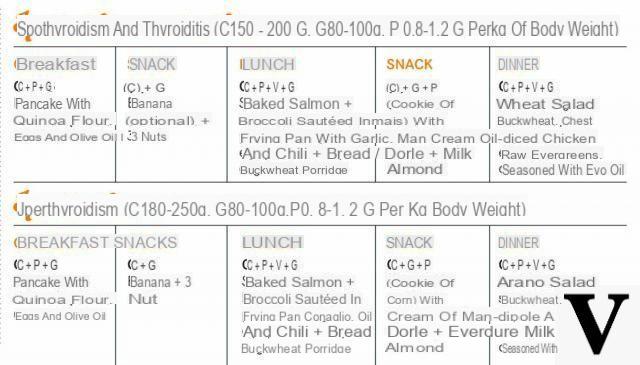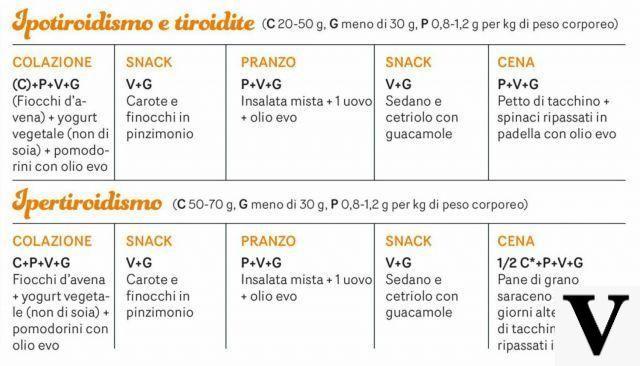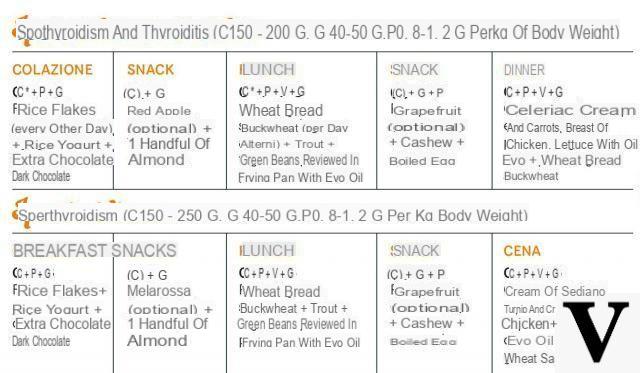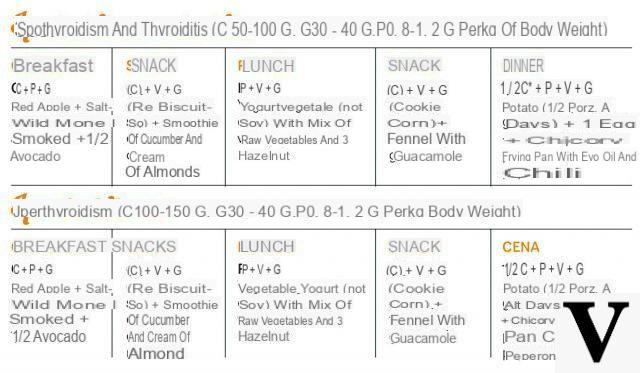There are about 6 million the villagers, especially women, who have thyroid problems. Never numbers could be much higher.
Many people don't know that fatigue, overweight, rapid heartbeat and more could depend on the malfunction of this endocrine gland located in the neck. If you have one or more of these disorders, it is better to talk to your doctor: he will be the one recommend the right exams (often a simple blood sample is enough) to understand if, for example, hypo or hyperthyroidism is causing the symptoms.
"As for the treatment, thenutrition can work wonders»Assures the doctor Serena Missori, endocrinologist and nutritionist in Rome, who knows very well, from personal experience, what it means living with a "malfunctioning" thyroid and how difficult it is to put it back in line by focusing exclusively on drugs. Together with Alessandro Gelli, a scientific researcher who has been using food as a therapy for years, wrote The Thyroid Diet (LSWR Edizioni, € 19,90). The two experts suggest a articulated plan, made up of targeted menus (as well as the use of supplements and stress management techniques) to treat a gland that works poorly, too much or is inflamed.
With the help of Dr. Missori let's take stock of nutrition, which must be customized thinking both of the disturbance to be monitored and of the physical and psychological characteristics of each of us.
«The goal is favor the rebalancing of altered biochemical and physiological mechanisms, in order to allow the body to "repair itself" by itself, as far as possible », says Serena Missori. How? «By bringing the foods that contain essential micronutrients for the optimal synthesis (or transformation) of thyroid hormones, such as tyrosine (an amino acid), iodine, selenium, zinc, vitamin A, iron. Without to forget those rich in vitamins D and group B, which serve to regulate metabolism, and healthy fats, which they extinguish the inflammation of the organism, one of the main causes of thyroid malfunction », says the expert.
FOODS YES
Among foods to prefer there are gluten-free cereals (rice, millet, sorghum, teff ...), pseudo-cereals (buckwheat, quinoa, amaranth), tubers and tuberous roots (sweet potatoes, radishes, celeriac, beetroot), organic eggs and meat (lamb, pork, chicken, beef, turkey), sliced without the addition of nitrates, nitrites, lactose and milk proteins.
You can eat the fresh or frozen fish always excluding swordfish (which could be contaminated by mercury) and tilapia and pangasius (because they survive even in very polluted waters and are low in good Omega 3 fats) and limiting, in case of hyperthyroidism, to no more than 2 servings per week of sea fish, shellfish and algae.
All spices and herbs (oregano, thyme, fennel seeds, sage, rosemary) can always be used.
Vegetables, vegetables and fruit they must be chosen among those in season and at zero kilometer. Ok to asparagus, fennel, lettuce, spinach and all types of cabbage, as long as they are cooked. Yes then to apricots, bananas, strawberries, kiwis, grapefruit, blueberries, loquats, pears, peaches, always preferably organic: «They do not contain residues of pesticides and pesticides, which are harmful to health in general and for the thyroid in particular. Some (defined as endocrine disruptors) they can in fact alter its functioning»Explains Dr. Serena Missori. «If you do not buy organic products, to remove any chemicals and waxes present, I recommend use castile soap and baking soda».
I CIBI NO
“During the 'therapy', which it must last at least 4 weeks, all foods that promote inflammation should be avoided ”, says the endocrinologist and nutritionist. «First those that contain gluten: wheat, rye, barley, kamut, spelled, spelled, triticale, monococcus and all "derived" products, such as pasta, bread, pizza, crackers, biscuits (the presence of this protein is always marked in bold in the list of ingredients) . It goes then milk of animal origin excluded. So watch out for butter, yogurt, cheeses, ice creams, sweets (also in this case it is essential to carefully check the information on the label of the packaged products) ».
The reason for these exclusions? «According to several studies, casein, like gluten, is responsible for "molecular mimicry": a mechanism that pushes antibodies produced by the immune system to attack not external enemies but one's own organs, including the thyroid, "explains the expert.
Among the foods to be limited there are vegetables (tomato, eggplant, peppers, fresh chilli) belonging to the Solanaceae family. "They are rich in saponins, substances that can contribute to the development of intestinal permeability (autoimmune disease) and alter the balance of the intestinal bacterial flora which, according to recent research, is responsible for thyroid problems, ”says the expert.
They finally go reduced legumes and other "ingredients" that can irritate the intestines. «All the foods mentioned can be reintroduced gradually, one at a time, at the end of the fourth week of the diet », Dr. Missori reassures.
IN WHICH BIOTYPE DO YOU RECOGNIZE YOURSELF THE MOST?
«Understanding this is essential for know which menu to follow. And when (and in what quantities) to bring to the table the various nutrients which, consumed at the right time of the day, convey correct information to the body and they help him to repair himself»Explains Dr. Missori.
Read therefore the following descriptions and then adopt the menu tailored for you.
↘Cerebral: has a triangular face, wide temples, basically dry and dehydrated skin, always contracted muscles, thin bone, hyperactive temperament, psychic hypersensitivity, acuity and nervousness, first class syndrome. He often suffers from tension headache, nervous colitis, gastritis.
Bilious: has an oval face, pronounced cheekbones, thin neck, medium muscles and bones, toned, hydrated and elastic skin, mental acuity without being inconclusive hyperactive, physical strength and endurance. He can suffer from insomnia and tend to gain weight.
↘Blood: has a square or parallelepiped face, an important thorax, strong musculature and bone. He can be very good-natured, mild-mannered, and condescending, but prone to depression and consoling binges, or be angry, bossy, aggressive. In both cases it accumulates fat on the abdomen.
↘Lymphatic: has a trapezoid face, pronounced jaw, wide neck, soft fat due to water retention. He is phlegmatic, lazy, whiny, and victimized.
And now continue reading and discover, in detail, how to organize the right menu for you.

MENU FOR THE BRAIN TYPE
Carbohydrates (gluten-free cereals, pseudo-cereals, grains, fruit, tubers and tuberous roots) must always be present in the main meals (breakfast, lunch and dinner) while their consumption is optional in mid-morning and mid-afternoon. The "dose" should be increased (always eating them as a snack) if your thyroid is functioning too much.

MENU FOR THE LYMPHATIC TYPE
In case of hypothyroidism and thyroiditis, carbohydrates should be consumed only for breakfast (and not necessarily). For the treatment of hyperthyroidism, however, they should always be brought to the table for breakfast and every other day for dinner. In the evening, moreover, the portion should be halved compared to what you usually eat.

MENU FOR THE BILIARY TYPE
Carbohydrates are allowed every other day for breakfast and lunch, and always for dinner (to promote sleep) if your problem is hypothyroidism or thyroiditis. In case of hyperthyroidism, however, they can be eaten every day even for breakfast and lunch. As a snack they are optional, whatever ailment you have.

MENU FOR THE BLOOD TYPE
Yes to carbohydrates at breakfast (always) and at dinner (every other day, halving the usual portion) if you are hypothyroid or have thyroiditis. In case of hyperthyroidism, however, you can consume them every day for both breakfast and dinner (respecting the half portion). Snacks are never mandatory.


























